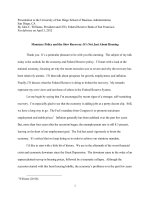Taxation in crisis tax policy and the quest for economic growth
Bạn đang xem bản rút gọn của tài liệu. Xem và tải ngay bản đầy đủ của tài liệu tại đây (4.26 MB, 316 trang )
Palgrave Macmillan Studies in Banking and
Financial Institutions
Series Editor
Philip Molyneux
University of Sharjah, Bangor, UK
The Palgrave Macmillan Studies in Banking and Financial Institutions series is international in
orientation and includes studies of banking systems in particular countries or regions as well as
contemporary themes such as Islamic Banking, Financial Exclusion, Mergers and Acquisitions, Risk
Management, and IT in Banking. The books focus on research and practice and include up to date and
innovative studies that cover issues which impact banking systems globally.
More information about this series at http://www.springer.com/series/14678
Editors
Dimitrios D. Thomakos and Konstantinos I. Nikolopoulos
Taxation in Crisis
Tax Policy and the Quest for Economic Growth
Editors
Dimitrios D. Thomakos
Department of Economics, University of Peloponnese, Tripolis, Greece
Konstantinos I. Nikolopoulos
Bangor Business School, Bangor University, Bangor, UK
Palgrave Macmillan Studies in Banking and Financial Institutions
ISBN 978-3-319-65309-9 e-ISBN 978-3-319-65310-5
/>Library of Congress Control Number: 2017956941
© The Editor(s) (if applicable) and The Author(s) 2017
This work is subject to copyright. All rights are solely and exclusively licensed by the Publisher,
whether the whole or part of the material is concerned, specifically the rights of translation,
reprinting, reuse of illustrations, recitation, broadcasting, reproduction on microfilms or in any other
physical way, and transmission or information storage and retrieval, electronic adaptation, computer
software, or by similar or dissimilar methodology now known or hereafter developed.
The use of general descriptive names, registered names, trademarks, service marks, etc. in this
publication does not imply, even in the absence of a specific statement, that such names are exempt
from the relevant protective laws and regulations and therefore free for general use.
The publisher, the authors and the editors are safe to assume that the advice and information in this
book are believed to be true and accurate at the date of publication. Neither the publisher nor the
authors or the editors give a warranty, express or implied, with respect to the material contained
herein or for any errors or omissions that may have been made. The publisher remains neutral with
regard to jurisdictional claims in published maps and institutional affiliations.
Cover Illustration: YAY Media AS / Alamy Stock Photo
Printed on acid-free paper
This Palgrave Macmillan imprint is published by Springer Nature
The registered company is Springer International Publishing AG
The registered company address is: Gewerbestrasse 11, 6330 Cham, Switzerland
To my children, Olympia and George, who patiently tolerate my daily grumping (albeit and
unfortunately true) about how high taxes and excessive regulation today stand in the way of their
own future .
–Dimitris
To my children, Ilias, Polyanna, and Spyros for the tax-free love they give me every day .
— Kostas
About the Editors
Dimitrios D. Thomakos is Professor of Applied Econometrics and Head of the Department of
Economics at the University of Peloponnese, Greece, and a senior fellow and member of the
Scientific Committee at the Rimini Center for Economic Analysis in Italy. He holds an M.A., an
M.Phil. and a Ph.D. from the Department of Economics of Columbia University. His research work
has appeared in several prestigious international journals in economics and finance such as The
Review of Economics and Statistics , Canadian Journal of Economics , Review of International
Economics , Journal of Empirical Finance , International Review of Financial Analysis ,
International Journal of Forecasting and others. He has been a guest co-editor for Mathematical
and Computer Modelling , an editorial board member of the Journal of Modern Applied Statistical
Methods and now serves on the editorial board of the International Journal of Energy and Statistics
. He is also the co-founder of QuantF.com. Thomakos and Nikolopoulos have jointly edited another
volume for Palgrave on the financial crisis and at the moment are authoring a technical book for
Wiley on the Theta method.
Kostas I. Nikolopoulos is the Director of for LAB, the forecasting laboratory (www.forLAB.eu)
in Bangor Business School and the think tank www.forTANK.com. He specializes in time series
analysis and forecasting, decision support systems and forecasting the impact of special events. He
holds a Ph.D. in Engineering from the National Technical University of Athens (ΕΜΠ). He holds the
Chair in Decision Sciences at Bangor Business School and is the College Director of Research
(Assistant Dean/Research) for the College of Business, Law, Education and Social Sciences in
Prifysgol Bangor University. His work has appeared in numerous journals, and he is an associate
editor of Oxford IMA Journal of Management Mathematics and Supply Chain Forum: An
International Journal . He is the co-originator of the Theta forecasting method and the Aggregation
Disaggregation Intermittent Demand Forecasting Approach (ADIDA) temporal aggregation methodimproving framework. Thomakos and Nikolopoulos have jointly edited another volume for Palgrave
on the financial crisis and at the moment are authoring a technical book for Wiley on the Theta
method.
Introduction
The Great Oxymoron
If we were to concede on assuming that the current era is one of global rebellion against economics
and economists, against the financial system and competitive enterprise, against the rich and
(significantly) against our neighbor who happens to be more industrious and thus richer than we are,
then this book would be forbidden. It would be hunted down by the government agencies responsible
for guarding the new-founded revolution against the return to global growth . It would, possibly, be
burned and ridiculed by erudite professors of great social compassion, albeit of little and (surely)
ideologically distorted knowledge of undergraduate economics. It would, however, make the
contributors of this volume the new resistance to the latest corpus of legitimized oppression:
unnecessary taxation , impossibly high tax rates, a witch hunt of supposedly hidden incomes , and a
state of public affairs already on regulatory failure, fueled by innumerable and economically
unfounded laws .
Is this what the global economy is coming to? Not yet. However, we are treading on dangerous
waters already. The great recession of 2008 and its global consequences on growth, fiscal , and
monetary policies did not only change our perspectives on how the economy works, they have created
an alarming situation, whereas common sense and sound economic logic have been replaced by
virtuous calls of destruction of a system that, although not without problems, has created the fastest
growth, a reduction in poverty, and most widely distributed benefits known after the Middle Ages.
We stress the word “virtuous” here: the many who have been speaking as economists with a sentiment
of moral advantage and self-imposed but fake social compassion on the problems of others can be
completely misleading—not on their intentions but on their anticipated results. 1
The calls for increased taxation, global redistribution , higher regulation, more laws on how the
economy should work, the war on global innovation, the proposed perpetuation of the failed welfare
state cannot make and have not made a difference in the lives of those in need. What they have done,
and will continue to do with force if these calls succeed, is to create powerful global monopolies, to
reduce competition, to increase the size of the government, to promote corruption , to increase the
chances that crises create a stream of new working poor.
There is where the Great Oxymoron lies: those that have been pretending to champion the
needs of the many are actually those that are guarding the privileges of the few. Those that are
willing to increase tax rates can only widen the income gap and not close it; those that are in favor of
more regulation are protecting the monopolies already in power and are making sure that the many
cannot rise beyond what the wage that these monopolies pay them. It is time that we address this
oxymoron and return to common economic sense. It is time that we shattered the vanity mirror of those
that by fooling themselves want to fool the rest of us. If this book is part of the new resistance, its
intent then is to take another strike on this mirror.
The problems associated with taxation and growth are not new and neither are the economically
viable and socially responsible solutions. The current state of global economic affairs is, however, in
urgent need to address these problems and to do so by providing solutions within the post-crisis
constraints. That is, without resorting to increased, debt-driven government spending or by a
perpetuation of non-conventional monetary policy or (worse) by a return to isolationist policies and
trade wars. Enter taxation: the only remaining viable instrument of policymaking not yet used but,
unfortunately, already abused. In this volume, we make the argument that taxation can and should be
used constructively in the only way possible: by lowering the tax and regulatory burden with a solid
understanding on the purpose of taxation and the methods it should use. Not only the reduction in
regulations and tax rates is conducive to growth, it is also the only possible method of creating the
appropriate motives for more work, more innovation, more investment , higher transparency , and less
waste of public resources. The contributors’ work amply illustrates these points and, in accord with
history and the literature, makes the argument even more forceful: you cannot generate growth by
dividing the existing pie into smaller and smaller pieces. This is the recipe for poverty and wider
inequality.
Taxation Is Distortion and Regulation
Is taxation necessary? Obviously. Beyond the ideological strife that surrounds the issue we all agree
that, despite the problems that it creates, it is the only way that public necessities can be satisfied.
However, raising taxes and spending them on these public necessities are not necessarily linked. For
once, we may all agree on the necessity of taxation, but we may not all agree on what these public
necessities should be and how the public funds obtained from taxation should be spent. Alternatively,
we may not all agree on the way that taxation is to be implemented. However, we hope that there
could be no disagreement that, however implemented, a tax system should serve the economy and not
the other way around. That is, a tax system should first and foremost promote economic growth , with
the rest of its potential functions following. So, what does a roadmap look like in addressing taxation
in crisis? Here are some vital points:
– The tax system should be structured so that it minimizes distortions in the economy: it should
not impede people from working more, it should not impede the transaction of business, it
should not create incentives for tax evasion , it should promote competition and not protect
monopolies, it should be transparent, and it should have the least possible impact on the
allocation of public resources to maintain it.
– A country’s tax system does not exist in isolation: we cannot address global growth problems
if we do not allow, in fact if we do not actively promote, tax competition. This stands to
reason for attracting domestic and foreign direct investment. The tax system should be able to
not only maintain investment levels in the economy but it should be able to provide incentives
to attract new, productive investments as well.
– The tax system is not a class-based system. Penalizing parts of society for their efforts in the
economic playfield should not be embedded in any system that collects private money for
public use. The tax system should promote fairness in the collection of tax revenues but, at the
same time, should promote fairness to access in the public goods that are funded by these
revenues.
– The tax system cannot be structured around the concept of redistribution . Beyond the historical
failures of any government-controlled attempts of direct income redistribution , we cannot
provide fuel for growth by the mere transferring of resources when we cannot know whether
these transferred resources will be used to generate new employment and added value to the
economy.
– Taxation is regulation and as such is possibly the most fail-prone regulatory framework that a
government has. By its very nature, the tax system will have to deal both with lack of
transparency , corruption , and tax evasion. A tax system that is overly complicated and guided
by many rules can only serve the vested interests of the policymakers, certainly not those of
entrepreneurs or the consumers.
– The treatment of personal income tax is of paramount importance for growth. While there is
heated debate on how to treat corporate income and corporate profits, there can be no debate
that high levels of personal income tax are detrimental for growth: one has only to take a look
at the recent growth paths of economies with relatively low top marginal tax rates on personal
income.
– A tax system cannot be structured around the, sure-to-fail, assumption of “more or higher tax
rates mean higher revenues”. The experience, especially from these countries that had
problems with tax collection and high tax evasion, shows that the focus should be on
collecting revenues by higher economic turnover and business, and consumption activity not
be higher rates—but then again, the concept of a tax elasticity may not be easy to grasp by
regulators.
It is potentially instructive for the reader, before going into the rest of this volume, to remember
that the problems associated with the collection of public revenue and the methods of doing it are not
new. We close this section with two characteristic historical excerpts, one from long ago and the
other from not that long ago. You will clearly see that the problem is perennial, but the ideas
presented in both excerpts are much in line with our times.
Moreover, I observe that already the state is exacting heavy contributions from you: you must
needs keep horses, pay for choruses and gymnastic competitions, and accept presidencies; and if
war breaks out, I know they will require you to maintain a ship and pay taxes that will nearly
crush you. Whenever you seem to fall short of what is expected of you, the Athenians will
certainly punish you as though they had caught you robbing them.
(Socrates to Critobulus—Xenophon, Oeconomicus )
We can clearly see in this first excerpt that the method of taxing wealthy Athenians was that of
direct taxation: what the state needed, the citizens provided directly, certainly not just in a central
government pool of funds to be administered as the government pleased. Furthermore, note a
significant view on taxation that relates to tax evasion: it was not to be tolerated. However, nowhere
in the classic literature do we find that the creation of wealth was to be penalized, for the creation of
wealth is useful—the problem lies with its use (e.g., Aristotle, Book IV, Nicomachean Ethics ). The
excerpt, put in the wider context of Xenophon’s work, just says the obvious: allow people to prosper
freely and when the need for raising public revenue arises, let them contribute based on their ability.
Is this far from contemporary ideas? Not really, as we can see below.
The method of raising revenue ought not to impede the transaction of business; it ought to
encourage it. I am opposed to extremely high rates, because they produce little or no revenue,
because they are bad for the country, and, finally, because they are wrong. We cannot finance the
country, we cannot improve social conditions, through any system of injustice, even if we
attempt to inflict it upon the rich. Those who suffer the most harm will be the poor. This country
believes in prosperity. It is absurd to suppose that it is envious of those who are already
prosperous. The wise and correct course to follow in taxation and all other economic legislation
is not to destroy those who have already secured success but to create conditions under which
everyone will have a better chance to be successful.
(Calvin Coolidge, 30th President of the United States)
This is another statement of growth and progress: encourage economic activity and tax so as to
raise revenue not to make class war —for they are the poor that will suffer the most in such a case. It
is far better to create more opportunities so that more in the economy will become prosperous. By the
way, during Coolidge’s presidency, one-fourth of the federal debt was retired during a period of low
taxation and with the growth of state and local governments rising and not falling. Maybe this is a
historical example to reconsider for our times?
The Contributions of This Volume
There are four sections in the book that cover many aspects of taxation and contain a wealth of review
material and many new theoretical and empirical results. Emphasis has been placed in covering the
international aspects of taxation but also the popular “lab rat” economy of our days, Greece . There
are chapters that deal with the historical and theoretical foundations of taxation, chapters on taxation
and growth in an international context, chapters on tax evasion and the cost of enforcement, chapters
on banking and energy taxation, and taxes on the complete regulatory and growth failure in reviving
the Greek economy. When viewed as the sum total of these contributions, we believe that this volume
will give the reader a fairly complete perspective on taxation in crisis, taxation as it stands today.
In the first section of the book, we start with five chapters that focus on taxation as regulation and
regulatory failure. The chapters cover issues ranging from a historical and philosophical overview of
taxation (“Taxation and rebellion—a historical and philosophical perspective” from Jane FrecknallHughes), the implications of majority rules on taxation, the interaction of inequality (“Majority rule,
rights and taxation” from Zacharias Dermatis, Panagiotis Evangelopoulos, and Panagiotis Liargovas),
democracy and progressive taxation (“Inequality in landownership, democracy and progressive
taxation : evidence from historical data” from Pantelis Kammas and Maria Poulima), the transparency
issue and tax heavens (“Tax heavens: the crisis of transparency ” from Mayya Konovalova, Penelope
Tuck, and Rodrigo Ormeno Perez) and, finally, the problems associated with the global treatment of
corporate taxes , with a focus in the case of Ireland (“Corporate profit’s tax avoidance : how the
‘double Irish’ impedes global social progress and removes the prosperity base needed for future
generations”. from Hanqing Yang, Dermot Cahill, and Edwin T. Wood)
In the second section of the book, we have four chapters that focus on taxation and growth. These
include two chapters on the impact of taxation on the growth of the Danish economy (“30 years of tax
reforms —how much impact on Danish growth?” from Otto Brøns-Petersen) and on tax shocks and
macroeconomic performance on the enlarged European Union (“Convergence of tax shocks and
macroeconomic performance in the enlarged European Union” from Athanasion Anastasiou). Then,
come another two chapters that discuss the impact of the cost of tax administration and enforcement
on economic growth (“Tax evasion, tax administration and the impact of growth: tax enforcement as
regulatory failure in a high tax rates, high tax evasion and low-growth economic environment” from
Yiolanda Vasilopoulou and Dimitrios D. Thomakos) and the interactions of tax evasion, tax morale ,
and economic growth (“Tax evasion, tax morale and the case of growth” from Andreas Tsalas and
Platon Monokrousos).
The third section of the book, although smaller in size, covers two particular aspects of nonincome-based taxation as, what we consider, pure political leverage. In the first of the chapters in this
section, we have a very interesting presentation about the implications of bank transaction taxes (“
Bank transaction taxes : international evidence and their implications” from Hiona Balfoussia,
Dimitris Malliaropoulos, Dimitris Papageorgiou, and Athanasios Tagkalakis), while in the second of
the chapters, we have a review on taxation in energy—a widely used alternative for covering revenue
losses from income tax evasion (“Taxing energy: why, how and how much?” from Thomas
Alexopoulos).
Finally, in the fourth and last section of the book, we end the volume with a characteristic
example of high tax rates and regulatory failure: Greece. In five chapters (“ Over-taxation of private
sector salaried employment as a key impediment to the recovery of Greece” double-chapter from
Michael Mitsopoulos, “The double trap: taxes and subsidies as determinants of economic growth and
the downward growth spiral in Greece” from Christos K. Tsenes and Dimitrios D. Thomakos, “Taxes
as barriers to sustainable economic prosperity : the case of Greece” from Panagiotis Liargovas and
Nikolaos Apostolopoulos, and “The impact of tax policy on the economic growth of Greece” from
Grigorios Spyrakis and Antonios Sarantidis”), and with a number of new results, it becomes clear
that the tax policies of the past and present coupled with the problems that the Greek economy is
facing today are just plain wrong. The over-taxation in all aspects of the Greek economy proves to be
a major barrier to growth revival, and the data fully support this assertion and the need for a complete
overhaul of the Greek tax system .
Dimitrios D. Thomakos
Konstantinos I. Nikolopoulos
Disclaimers
The Editorial team emphasizes that the contributor’s views expressed in their respective chapters are
their personal views and do not express the views of any of their previous or current employers.
Disclaimer from Otto Brøns-Petersen
While I have benefitted from discussions with colleagues at CEPOS and other Danish economists,
I alone am responsible for the views and errors of this chapter.
Acknowledgments
This book would not have been possible without the inspiration and support that we have received
from the reception of our earlier book in this series “A Financial Crisis Manual: Reflections and the
Road Ahead”.
A lot of people contributed to this volume, and we would like to acknowledge the efforts and time
of our contributing authors that resulted in original work and new results on the impact of taxation and
growth. We thank you all for being part of this book.
A special thank you goes to our ever-present editorial assistance team, particularly to Dr.
Andreas Tsalas, both for his excellent contribution but also for his excellent organization and
workflow coordination in the preparation of this volume, and to Dr. Thomas Alexopoulos for his
constant support and help.
The Springer-Palgrave editorial team, initially Aimee Dibbens and in the latest and most crucial
stages Natasha Denby, as well as the production team, has been with us in the whole duration of the
project and we thank them for all their support, encouragement, and suggestions that improved the
final outcome. Also our gratitude to Professor Phil Molyneux, Editor-in-Chief for the Palgrave
Macmillan Studies in Banking and Financial Institution Series for his decision to approve our
proposal and his comments and suggestions at all stages of the project.
A final thanks to all our colleagues and students who have been “freshening” up our take, view,
ideas, and thinking on the topic throughout the years.
Contents
Part I Taxation as Regulation & Regulatory Failure
1 Taxation and Rebellion: A Historical and Philosophical Perspective
Jane Frecknall-Hughes
2 Majority Rule, Rights, and Taxation
Zacharias Dermatis, Panagiotis Evangelopoulos and Panagiotis Liargovas
3 Inequality in Landownership, Democracy, and Progressive Taxation: Evidence from Historical
Data
Pantelis Kammas and Maria Poulima
4 Tax Heavens: The Crisis of Transparency
Mayya Konovalova, Penelope Tuck and Rodrigo Ormeño-Pérez
5 Corporate Profits’ Tax Avoidance: How the “Double Irish” Impedes Global Social Progress
and Removes the Prosperity Base Needed for Future Generations
Harry (Hanqing) Yang, Dermot Cahill and Edwin T. Hood
Part II Taxation, Tax Evasion and Growth
6 30 Years of Tax Reforms: How Much Impact on Danish Growth?
Otto Brøns-Petersen
7 Convergence of Tax Shocks and Macroeconomic Performance in the Enlarged European
Union
Athanasios Anastasiou
8 Tax Evasion, Tax Administration, and the Impact of Growth: Tax Enforcement as Regulatory
Failure in a High Tax Rates, High Tax Evasion, and Low-Growth Economic Environment
Yiolanda Vasilopoulou and Dimitrios D. Thomakos
9 Tax Evasion, Tax Morale, and the Case for Growth
Andreas Tsalas and Platon Monokroussos
Part III Non-Income Taxation as Pure Political Leverage
10 Bank Transaction Taxes: International Evidence and Potential Implications for Greece
Hiona Balfoussia, Dimitris Malliaropulos, Dimitris Papageorgiou and Athanasios Tagkalakis
11 Taxing Energy: Why, How, and How Much?
Thomas A. Alexopoulos
Part IV “Resistance is Futile”: Greece and the Failure of Tax Policy
12 Overtaxation of Private Sector Salaried Employment as a Key Impediment to the Recovery
of Greece
Michael Mitsopoulos
13 The Reaction of the Greek Private Sector Job Market to Changes in Tax Rates and
Uncertainty
Michael Mitsopoulos
14 The Double Trap: Taxes and Subsidies as Determinants of Economic Growth and the End of
the Downward Growth Spiral in Greece
Christos K. Tsenes and Dimitrios D. Thomakos
15 Taxes as Barriers to Sustainable Economic Prosperity: The Case of Greece
Panagiotis Liargovas and Nikolaos Apostolopoulos
16 The Impact of Tax Policy on the Economic Growth of Greece
Grigorios Spirakis and Antonios Sarantidis
Afterwor(l)d: We Are the New Resistance
Index
List of Figures
Fig. 4.1 Financial Wealth Held in Tax Havens (2014)
Fig. 4.2 “Dodgy Shopping Count”: OECD, Tax Haven, and Developing Nation
Fig. 6.1 Marginal tax rate
Fig. 7.1 Accumulated responses to one standard deviation innovation to total revenue
Fig. 7.2 Correlations of total revenue, direct, and indirect tax shocks, pooled EU27 sample
Fig. 7.3 Correlation coefficients for total tax shocks, 2003Q1–2016Q3
Fig. 7.4 Correlation coefficients for direct and indirect tax shocks, 2003Q1–2016Q3
Fig. 10.1 Real economy
Fig. 10.2 Financial sector
Fig. 11.1 Primary energy flow by source and sector
Fig. 11.2 Revenue from energy, pollution, and resources and environmental taxes in percentage of
total revenue from taxes and social contributions 2013
Fig. 11.3 Total energy-related taxes as share of GDP 2015
Fig. 11.4 Total energy and environmental taxes as share of GDP in Euro area
Fig. 11.5 Tax component as a percentage of the total price
Fig. 11.6 The electricity consumption of Germany per real GDP ppp (GWh/€billion), expressed in
index form
Fig. 12.1 Distribution of taxable income from salaries and from pensions, 2015 personal income tax
declaration. Data regarding statistics of filed tax returns available at AADE website. Annual
statistical bulletin for tax year 2015
Fig. 12.2 Distribution of tax rebate benefit across income brackets. Comparison of actual tax burden
per bracket and of tax burden that would follow in the case of an abolition of the rebate. Data
regarding statistics of filed tax returns available at AADE website. Annual statistical bulleting for tax
year 2015
Fig. 12.3 Distribution of tax rebate benefit across income brackets. Allocation to income from
pensions and from wages. Data regarding statistics of filed tax returns available at AADE website.
Annual statistical bulletin for tax year 2015
Fig. 12.4 Distribution of tax rebate benefit across income brackets and distribution of taxpayers
across the same brackets. Data regarding statistics of filed tax returns available at AADE website.
Annual statistical bulletin for tax year 2015
Fig. 12.5 Distribution of government income from extraordinary solidarity levy on wage and pension
income. Data regarding statistics of filed tax returns available at AADE website. Annual statistical
bulletin for year 2015
Fig. 12.6 Distribution of social security payments to IKA. IKA data on basic wage payments,
December and June 2015 average, and extrapolation on annual basis
Fig. 12.7 Tax wedge for an individual costing 62000 euro per year to his employer, Greek and OECD
countries. OECD taxing wages database, 2015, Greek laws
Fig. 12.8 Tax wedge for Greek and OECD countries, for range of incomes as percentage of country
single childless average earner. OECD taxing wages database, 2015. PIT personal income tax, SSC
social security contributions
Fig. 12.9 Employment in business sector according to company size. European Commission SBA
Factsheet 2015 for Greece
Fig. 12.10 The evolution of full-time employment 2010–2015, according to company size
Fig. 12.11 Evolution of part-time employment
Fig. 12.12 Comparison of progressivity of personal income tax and property tax, 2015
Fig. 14.1 Total Consumption as a share of GDP
Fig. 14.2 Capital formation in absolute levels and as a share of GDP
Fig. 14.3 Exports minus Imports as a share of GDP
Fig. 14.4 Subsidies as a share of GDP
Fig. 14.5 General Government Balance as a share of GDP
Fig. 14.6 The IS/LM curves
Fig. 14.7 Total revenue and total expenditure as a share of GDP
Fig. 15.1 Higher tax rates in Greece, in the EU, and in the Eurozone
Fig. 15.2 Evolution of tax collection on income of physical and legal entities and tax on property (in
bn. €)
Fig. 15.3 Total receipts from taxes and social contributions (including imputed social contributions)
after deduction of amounts assessed but unlikely to be collected, % of GDP
Fig. 15.4 Implicit tax rates on labor 2003–2012
Fig. 15.5 Implicit tax rate on consumption 2003–2012
Fig. 16.1 GDP growth and the Tax Policy Index
Fig. 16.2 Foreign direct investments and the Tax Policy Index
List of Tables
Table 3.1 Equality in land distribution ownership and progressive taxation 1815–2000, benchmark
results
Table 3.2 Equality in land distribution ownership and progressive taxation 1815–2000, robustness
Table 3.3 Equality in land distribution ownership and progressive taxation 1815–2000 (Interactions
with the political regime)
Table 3.4 Equality in land distribution ownership and progressive taxation 1815–2000, national and
local tax rate data
Table 6.1 GDP effects
Table 6.2 Revenue-change (% of GDP)
Table 6.3 Change (% of GDP)
Table 7.1 Total revenue statistics shocks, summary
Table 7.2 Direct and Indirect tax shocks, summary statistics
Table 7.3 Summary statistics for total revenues, direct and indirect shock correlations, trade
openness, budget deficits, interest rates, income differences, and union density (paneled EU27
sample)
Table 7.4 Correlation coefficients for total, direct, and indirect tax shocks, 2003Q1–2016Q3
Table 7.5 Symmetry of total revenue shocks, paneled sample EU27
Table 7.6 Symmetry of direct tax shocks, paneled sample EU27
Table 7.7 Symmetry of indirect tax shocks, paneled sample EU27
Table 8.1 Growth rate and enforcement costs
Table 8.2 Tax rates and enforcement costs
Table 8.3 Panel models estimation
Table 10.1 Average effect of a bank transaction tax over the first four quarters
Table 10.2 Bank account debit taxes in Latin America
Table 10.3 Bank transaction taxes in Latin America
Table 12.1 Estimate of cost to offer tax rebate/grand to families with children and high-age
pensioners. Demographic data, Eurostat/Elstat
Table 12.2 Social security contributions and personal income tax as % of GDP along with employee
and self-employed to population ratios
Table 12.3 Summary of results from Tables 13.1–13.4
Table 13.1 OLS regressions for part-time employment 300 till 500 euro monthly gross wage
Table 13.2 OLS regressions for log differences of full-time employment, wage bracket 1150 till 2000
euro monthly gross wage on untransformed differences
Table 13.3 OLS regressions for log differences of full-time employment, wage bracket 2000 till 4000
euro monthly gross wage on untransformed differences
Table 13.4 OLS regressions full-time employment, wage bracket 500 till 1100 euro monthly gross
wage
Table 14.1 Full sample descriptive statistics 1999–2016
Table 14.2 Post-Crisis Descriptive Statistics 2010–2016
Table 14.3 Model estimates, Eq. (14.1), full sample 1999–2016
Table 14.4 Model estimates for consumption growth
Table 14.5 Long-Run Estimates, Eq. (14.2)
Table 14.6 Scaled estimates from Model 6 of Table 14.3
Table 15.1 Implicit tax rates on consumption and labor 2003–2012
Table 15.2 Effective marginal tax rate % (EMTR) on corporate investment 2004–2014
Table 15.3 Effective average tax rate % (EATR) on corporate investment, 2004–2014
Table 15.4 Ranking of countries based on the total corporate tax rate and the distortionary effect of
taxes on work incentives and investment
Table 16.1 Τhe variables and their summary statistics
Table 16.2 Regression results for GDP and FDI
Table 16.3 GARCH and GARCH-M (1,1) estimates of GDP and FDI with Tax Policy Index in mean
and variance
Table 16.4 Definition and source of the variables
Footnotes
1 The problem with virtue on matters of economics and taxation is not new. The following myth by Aesop illustrates the point made in
the text. A certain Lion, who reigned the absolute tyrant of the forest, on a time arbitrarily proposed to exact from his slavish
subjects a sufficient part of their daily prey for his own maintenance, that he might not himself toil for his subsistence; and
that every beast should contribute according to his means in the form of a tax; but how to adjust this impost was the
difficulty. The Tiger was the first who gave his opinion on this knotty point, saying that the properest and justest way would
be to lay a tax on vice, and that each Beast should settle the quantity for his neighbor, as by that means it would prevent any
selfish partiality. “No, no,” said the Elephant, “that will never be just, as it will give power to ill-will and oppression. The best
manner, in my judgment, would be to lay the tax on virtues, and leave it to everyone to give in a catalogue of his own, and
then there is very little doubt but it would prove the means of raising a most ample and rich exchequer. If only those that are
making these virtuous calls were the first to comply with them. Unfortunately, global practice has shown that they do not.
Part I
Taxation as Regulation & Regulatory Failure









